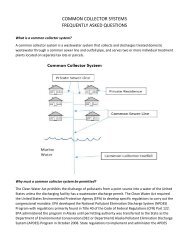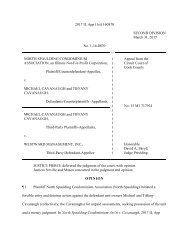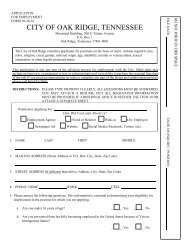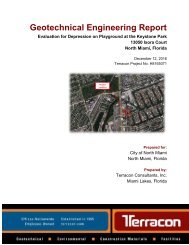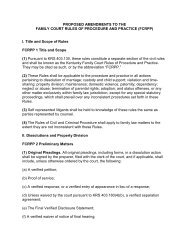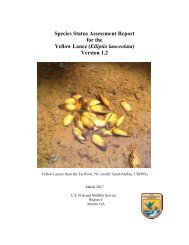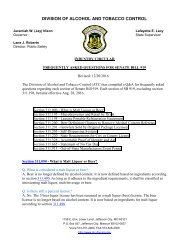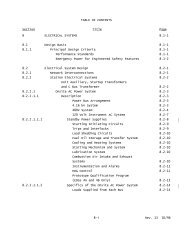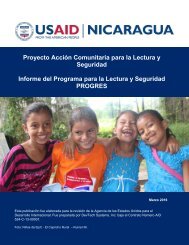COMMUNITY DISPUTE RESOLUTION IN TIMOR-LESTE
PA00MJQC
PA00MJQC
Create successful ePaper yourself
Turn your PDF publications into a flip-book with our unique Google optimized e-Paper software.
dealt with in some way in communities. Although the Penal Code (art.55(2)) recognises previous<br />
reconciliation between the parties as a mitigating factor in sentencing, no guidance is given on how<br />
such reconciliations affect civil compensation. And no systematic framework is established for<br />
diversion of minor cases to informal resolution, despite the fact (as set out above) that very many<br />
cases involving semi-public crimes are ultimately resolved by settlement. The CPC is in this respect a<br />
missed opportunity to set out basic parameters for communities’ role and to benefit from community<br />
resolution in cases where it is appropriate. The CPC could, ideally:<br />
• Expressly provide that communities may resolve claims for civil compensation and take steps to<br />
restore community harmony, even while a criminal prosecution is ongoing for the same incident;<br />
• Make clearer that in cases of semi-public crimes, a complainant may withdraw a complaint and<br />
thereby terminate the criminal proceedings. The CPC could give recognition to the possibility of<br />
this occurring through a community resolution, and could include procedures for systematically<br />
considering local settlements as a means by which this may occur (where done in accordance with<br />
due process and duly recorded in writing and signed). Under the current framework a further<br />
process of verification by prosecutors is necessary before a complaint can be withdrawn;<br />
• Set out minimum standards to be applied where informal justice mechanisms resolve civil<br />
compensation claims and/or lead to a decision to withdraw a complaint in a semi-public case;<br />
• Make explicit and clear the impact on criminal proceedings where other aspects of the case have<br />
already been dealt with through informal justice procedures. This should include making clear the<br />
impact on guilt or innocence, on sentence (in the event of a conviction), and on civil liability.<br />
Currently none of these questions are dealt with explicitly by the CPC.<br />
Finally, the question of community based informal justice being used to sanction people for violating<br />
local regulations is nowhere provided for in the CPC. Indeed, insofar as such procedures involve the<br />
imposition of criminal penalties, the CPC in fact disallows them. As noted above, it provides that only<br />
the formal courts may administer criminal justice. 55 If the GoTL were to permit community-imposed<br />
sanctions under local regulations, the CPC would need to be amended in order to take account of this,<br />
among other changes required to address the human rights issues addressed in next section.<br />
IV. HUMAN RIGHTS ISSUES ARIS<strong>IN</strong>G FROM THE <strong>IN</strong>FORMAL JUSTICE SECTOR<br />
Applicable human rights standards<br />
Two categories of human rights standards are relevant to informal justice mechanisms: those<br />
concerning the substantive principles which a mechanism applies; and those concerning its<br />
accessibility and procedures.<br />
(1) Substantive principles applied<br />
Informal justice mechanisms often apply a separate body of substantive law– sourced from<br />
indigenous traditions rather than state institutions. Human rights bodies have expressed concern<br />
that principles applied by informal justice mechanisms must comply with human rights standards.<br />
Such concerns often relate to discrimination and violence against women 56 although other<br />
concerns such as the use of corporal punishment have also been raised. 57 Human rights bodies<br />
55<br />
Criminal Procedure Code, article 7(1).<br />
56<br />
Although the treaty bodies are usually not explicit, this appears to be their concern in the following<br />
documents: CEDAW, Concluding Observations (Botswana), CEDAW/C/BOT/CO/3, 26 March 2010, paras 13, 17;<br />
CEDAW, Concluding Observations (Kenya), CEDAW/C/KEN/CO/7, 5 April 2011, para.13; CEDAW, Concluding<br />
Observations (Mexico), CEDAW/C/MEX/CO/7-8, 27 July 2012, para.34; HRC, Concluding Observations (Nepal),<br />
CCPR/C/NPL/CO/2, 15 April 2014, para.13;<br />
57<br />
HRC, Concluding Observations (Bolivia), CCPR/C/BOL/CO/3, 6 December 2013, para.16.<br />
13



